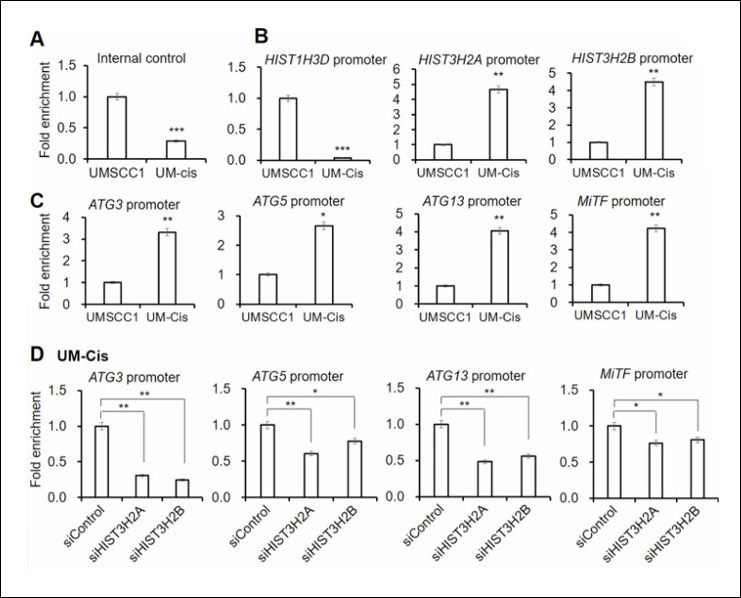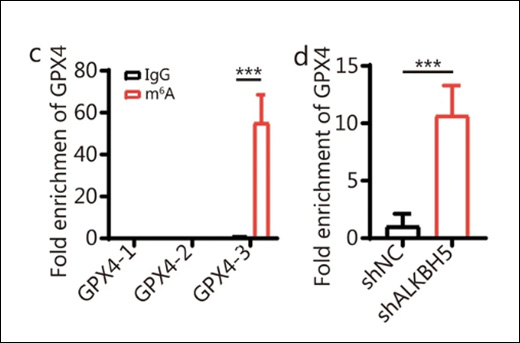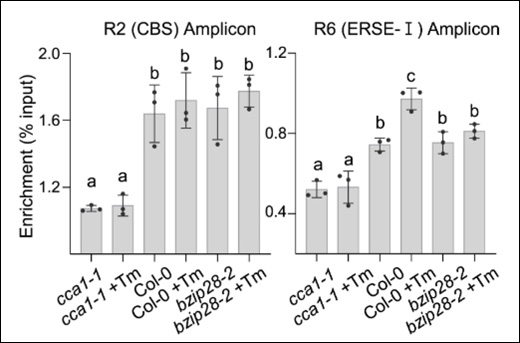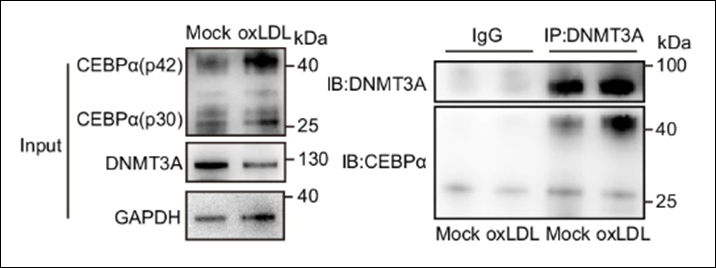Liang E et. al. (June 2023). M6A modification promotes blood-brain barrier breakdown during cerebral ischemia/reperfusion injury through increasing matrix metalloproteinase 3 expression Heliyon. 9(6):e16905.
The article investigates the role of N6-methyladenosine (m6A) modification in blood-brain barrier (BBB) breakdown during cerebral ischemia-reperfusion (I/R) injury. The study demonstrates that m6A modification increases the expression of matrix metalloproteinase 3 (MMP3), a proteolytic enzyme involved in BBB breakdown, and inhibition of m6A modification reduces MMP3 expression and improves BBB integrity. These findings suggest that targeting m6A could be a potential therapeutic approach for cerebral I/R injury.
(Products Used: EpiQuik m6A RNA Methylation Quantification Kit (Colorimetric))
Man J et. al. (June 2023). Oxidative Stress Induced by Arsenite is Involved in YTHDF2 Phase Separation Biol Trace Elem Res.
The article investigates the relationship between arsenite-induced oxidative stress and phase separation of YTHDF2, an N6-methyladenosine RNA binding protein. The study demonstrates that arsenite exposure promotes oxidative stress and YTHDF2 phase separation in a concentration-dependent manner, while antioxidant treatment relieves oxidative stress and inhibits YTHDF2 phase separation. The findings highlight the role of oxidative stress in YTHDF2 phase separation driven by N6-methyladenosine modification.
(Products Used: EpiQuik m6A RNA Methylation Quantification Kit (Colorimetric))
He H et. al. (June 2023) METTL14 is decreased and regulates m6 A modification of α-synuclein in Parkinson's disease J Neurochem.
The study explores the role of N6-methyladenosine (m6A) modification and its underlying mechanism in Parkinson's disease (PD). The results demonstrate that decreased levels of m6A and its modulators, particularly METTL14, are associated with PD, and METTL14 is involved in the abnormal m6A modification of α-synuclein mRNA, a protein implicated in PD pathogenesis, suggesting the potential of METTL14 as a diagnostic biomarker for PD.
(Products Used: EpiQuik m6A RNA Methylation Quantification Kit (Colorimetric))
Wu S et. al. (June 2023). Therapeutic m6A Eraser ALKBH5 mRNA-Loaded Exosome-Liposome Hybrid Nanoparticles Inhibit Progression of Colorectal Cancer in Preclinical Tumor Models ACS Nano.
This study reveals the significance of ALKBH5 in colorectal cancer (CRC) progression and demonstrates that ALKBH5 mRNA-loaded exosome-liposome hybrid nanoparticles effectively inhibit CRC progression in preclinical tumor models. The findings highlight the potential of ALKBH5 as a therapeutic target and provide a promising approach for CRC treatment using ALKBH5 mRNA nanotherapeutics.
(Products Used: EpiQuik m6A RNA Methylation Quantification Kit (Colorimetric))
Yu Z et. al. (June 2023). FTO alleviates cerebral ischemia/reperfusion-induced neuroinflammation by decreasing cGAS mRNA stability in an m6A-dependent manner Cell Signal. 109:110751.
This study demonstrates that N6-Methyladenosine (m6A) modification is involved in microglia-mediated inflammation in cerebral ischemia/reperfusion (I/R) injury, and the fat mass and obesity-associated protein (FTO) plays a role in regulating this process. Inhibition of m6A modification or overexpression of FTO alleviates brain injury and suppresses microglia-mediated inflammation by reducing cGAS mRNA stability and inhibiting the Sting/NF-κB signaling pathway, suggesting the potential of m6A-based therapeutics for treating ischemic stroke-related inflammation.
(Products Used: EpiQuik m6A RNA Methylation Quantification Kit (Colorimetric))
Wang A et. al. (June 2023). FTO promotes the progression of cervical cancer by regulating the N6-methyladenosine modification of ZEB1 and Myc Mol Carcinog.
This study reveals that the fat mass and obesity-associated protein (FTO) is highly expressed in cervical cancer and promotes its progression by regulating the N6-methyladenosine (m6A) modification of Zinc finger E-box binding homeobox 1 (ZEB1) and Myelocytomatosis oncogene (Myc). Silencing FTO suppresses the proliferation, migration, and invasion of cervical cancer cells, suggesting FTO as a potential therapeutic target for cervical cancer.
(Products Used: EpiQuik m6A RNA Methylation Quantification Kit (Colorimetric))
Zhou Z et. al. (December 2023). Splicing factor TRA2A contributes to esophageal cancer progression via a noncanonical role in lncRNA m6 A methylation Epigenetics. 18(1):2217033.
This study demonstrates that the splicing factor TRA2A, known for its role in mRNA splicing, also plays a noncanonical role in the regulation of long non-coding RNA (lncRNA) methylation in esophageal cancer. TRA2A upregulation promotes the m6A modification of the oncogenic lncRNA MALAT1, leading to structural changes and increased stability, while its depletion suppresses tumor growth and affects the expression of other key methylation proteins.
(Products Used: EpiQuik CUT&RUN m6A RNA Enrichment (MeRIP) Kit)
Li Z et. al. (June 2023). Sucrose-nonfermenting 1 kinase activates histone acetylase GCN5 to promote cellulase production in Trichoderma Appl Microbiol Biotechnol.
This study investigates the role of the protein kinase SNF1 and the histone acetylase GCN5 in promoting cellulase production in Trichoderma viride Tv-1511. The results demonstrate that SNF1 activates GCN5, leading to changes in histone acetylation, enhanced expression of cellulase genes, and increased cellulolytic enzyme activity, providing insights for optimizing industrial cellulolytic enzyme production in Trichoderma.
(Products Used: EpiQuik Total Histone Extraction Kit)
Imbe H et. al. (June 2023). Mu opioid receptor expressing neurons in the rostral ventromedial medulla are the source of mechanical hypersensitivity induced by repeated restraint stress Brain Res. :148465.
In this study, researchers investigated the neural mechanism underlying stress-induced hyperalgesia (SIH). By examining the expression of Mu opioid receptor (MOR) mRNA, MeCP2, and global DNA methylation in the rostral ventromedial medulla (RVM) of rats subjected to repeated restraint stress, they found that MOR-expressing neurons in the RVM play a significant role in inducing SIH.
(Products Used: MethylFlash Global DNA Methylation (5-mC) ELISA Easy Kit (Colorimetric))
Huang S et. al. (June 2023). Jieduquyuziyin prescription enhances CD11a and CD70 DNA methylation of CD4+ T cells via miR-29b-sp1/DNMT1 pathway in MRL/lpr mice J Ethnopharmacol. :116776.
This study investigates the therapeutic effect of a traditional Chinese medicine, JP, on systemic lupus erythematosus (SLE) in mice. The results demonstrate that JP decreases renal inflammation, reduces collagen fiber content, and promotes CD11a and CD70 DNA methylation through the miR-29b-sp1/DNMT1 pathway, highlighting its potential as a treatment for SLE.
(Products Used: MethylFlash Global DNA Methylation (5-mC) ELISA Easy Kit (Colorimetric))
Karaman EF et. al. (June 2023). The role of chromatin-modifying enzymes and histone modifications in the modulation of p16 gene in fumonisin B1-induced toxicity in human kidney cells Mycotoxin Res.
The article investigates the effects of fumonisin B1 (FB1) on epigenetic modifications and molecular alterations in human kidney cells. The study finds that FB1 exposure leads to changes in DNA methylation, upregulation of DNMT3a and DNMT3b, downregulation of chromatin-modifying genes, and alterations in histone modifications, suggesting a potential role of epigenetic mechanisms in FB1-induced carcinogenesis.
(Products Used: MethylFlash Methylated DNA Quantification Kit (Fluorometric))
Wang Z et. al. (June 2023). The transcription factor NtERF13a enhances abiotic stress tolerance and phenylpropanoid compounds biosynthesis in tobacco Plant Sci. :111772.
This study investigates the role of NtERF13a, a transcription factor, in regulating plant metabolism and stress resistance in tobacco. The study demonstrates that NtERF13a overexpression enhances plant resistance to salt and drought stresses and promotes the biosynthesis of phenylpropanoid compounds by directly regulating key genes in the phenylpropanoid pathway.
(Products Used: EpiQuik Chromatin Immunoprecipitation (ChIP) Kit)
Liu W et. al. (June 2023). ABI5 promotes heat stress-induced chlorophyll degradation by modulating the stability of MYB44 in cucumber Hortic Res. 10(6):uhad089.
The article explores the molecular mechanisms of high temperature-induced chlorophyll degradation in cucumber plants. The study demonstrates that ABI5 positively regulates heat stress-induced chlorophyll degradation by promoting the expression of key genes in the chlorophyll catabolic pathway, as well as by interacting with MYB44 to alleviate its inhibitory effect on those genes through protein degradation.
(Products Used: EpiQuik Plant ChIP Kit)
Tian C et. al. (June 2023). Culture conditions of mouse ESCs impact the tumor appearance in vivo Cell Rep. 42(6):112645.
This article investigates the effects of different culture conditions on the pluripotency and cell fate of mouse embryonic stem cells (ESCs) in vivo. The study reveals that conventional ESC cultures in serum/LIF-based conditions produce healthy ESC mice with no visible abnormalities for up to 1.5-2 years, while prolonged chemical-based cultures develop atypical teratomas or leiomyomas, indicating the need for further refinement of culture conditions to promote pluripotency and safety in ESC applications.
(Products Used: MuERVL-Gag Polyclonal Antibody)




 Cart (0)
Cart (0)













